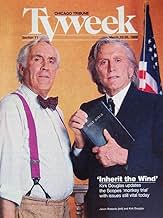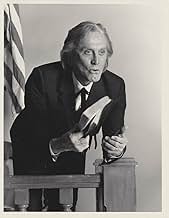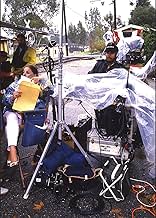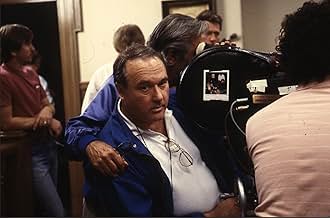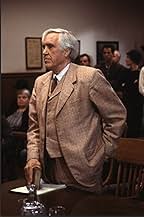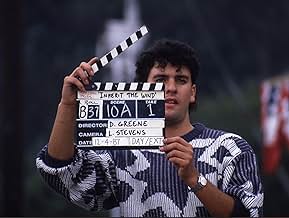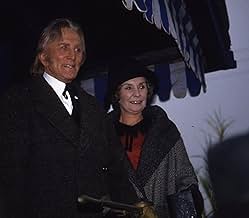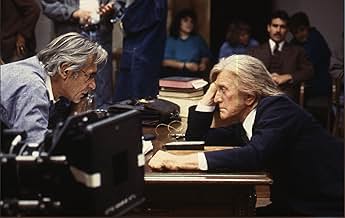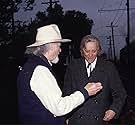Füge eine Handlung in deiner Sprache hinzuA biblical orator opposes a liberal lawyer defending a man for teaching Darwinism in the 1920s South.A biblical orator opposes a liberal lawyer defending a man for teaching Darwinism in the 1920s South.A biblical orator opposes a liberal lawyer defending a man for teaching Darwinism in the 1920s South.
- Regie
- Drehbuch
- Hauptbesetzung
- 2 Primetime Emmys gewonnen
- 2 Gewinne & 1 Nominierung insgesamt
- Bailiff
- (as Thom McCleister)
- Radio Newsman
- (as Richard Gilbert Hill)
Empfohlene Bewertungen
This was that film. I saw it when it was first aired when I was 14 and it made an impression on me. We had read the play a year earlier in 7th grade but it was Jason Robard's portrayal of the playfully witty grumpy grandpa who made the movie.
If you like Robards this movie cannot be missed. His portrayal of an ideal Atheist is good, even if it the reality of Clarence Darrow's personality. The way he gives sage advise to Cates about "Golden Dancer" - "Bert, whenever you see something bright, shining, perfect-seeming—all gold, with purple spots—look behind the paint! And if it's a lie—show it up for what it really is!" - cannot be beat. Robard's perfect rendition of this epic metaphor for a young man to follow in his hard and often lonely search for truth is what makes this film.
As an adult now, I have seen the classic version of this but there are benefits to this old made for TV movie - if you can find it, see it - and also drop me a line about where I can find it - I had my old VHS for years but can't find it!
In case you haven't seen the original, the story is an adapted version of the famous Scopes Monkey trial in the 1920s. A teacher in America's Deep South, teaches his students about Charles Darwin, and he's arrested. The majority of the film takes place in the courtroom, as two legendary lawyers battle the issue. So, if you don't like one of the two lead actors, it will greatly affect your enjoyment of the film. I'm not a Spencer Tracy fan, but with Jason Robards taking his place in the remake, I began to appreciate Spence's performance better. I know there are some people out there who are Jason Robards fans, but I'm not one of them. He's just not likable, and he always seems tired, bored, slightly angry, and wishing he was anywhere but on a film set.
If you really like Kirk Douglas, you'll probably want to see this movie, but it's not nearly as good as the original. Jean Simmons plays Kirk's wife, and even though she gives a good performance, there was nothing really wrong with her predecessor, Florence Eldridge. Watch the original, and if you really enjoy the story and like Kirk Douglas, then you can rent this one.
Jason Robards played Drummond/Darrow very well - in the tradition of Muni, Tracy, and Melvyn Douglas. But it was the performance of Kirk Douglas as Brady/Bryan that was unique. As I have mentioned elsewhere in these reviews, Bryan did have valid reasons to dislike Darwinism aside from religious feelings. The issue of Social Darwinism, created by an English elitist snob named Herbert Spencer, had been grabbed by various people in power positions in big business and politics that suggested that the best people were the top of the evolutionary tree - and that big business had the right to destroy small competitors due to "survival of the fittest". Bryan hated this idea, as opposite to Jeffersonian Democracy. He actually intended, after his own humiliation on the witness stand by Darrow to put Darrow on the stand to explain his acceptance of Social Darwinism. Judge Raulston, the trial judge, refused to allow this.
If that had been brought out in this production, it would have set it apart and given a more balanced view of the two parties who clashed in Dayton. Instead, Douglas played Brady like a revivalist (similar to Begley, without Begley's physical resemblance to Bryan). But he also kept trying to keep up the friendly feelings that Darrow and Bryan had when both were fighting on the same side on political issues from 1893 to 1908. While all the productions include those moments of nostalgia between them, this attempted to suggest that Douglas/Brady hoped to "save" the soul of Robards/Drummond. It was a curious idea, but it just did not seem realistic (given their diametrically opposite views on evolution and the Tennessee law). I give this a 7 for the production but the approach was a misfire.
And where the old black and white version suggested the oppressive heat and humidity of Dayton, Tennessee, this one didn't even come close. Darren McGavin who played H. L. Mencken was quite good though and easily erased the memory of Gene Kelly in the original. And I've always adored Jean Simmons in most of what she did. Kyle Secor was the Scopes character (I mistook him for Matthew Broderick) and was very adequate.
I'd be interested to see (again?) the 1965 TV version with Melvyn Douglas and Ed Begley but I don't remember it at all if I did see it.
Wusstest du schon
- WissenswertesThe real William Jennings Bryan ran for President three times: 1896, 1900, and 1908. Bryan was the first Presidential candidate to extensively barnstorm during a Presidential campaign in an era when most candidates did not. Although it's suggested that he might be contemplating a run in the next election, which would have been in 1928, it's highly unlikely. He did serve in public office twice - as Congressman from Nebraska from 1891 to 1895 and as Secretary of State under Woodrow Wilson from 1913 to 1915, when he resigned over the country's policy toward Germany after the Lusitania was sunk. Despite his fundamentalist Christian beliefs, he was considered as Liberal and Progressive, supporting anti-Imperialist policies and trust-busting.
- PatzerIn several courtroom scenes when the focus is on Bertram Cates, the actor, Kyle Secor, wears glasses in which you can see the reflection of the production lights as well as white flags used by the production staff to mute the lights. In the 1930s, courtrooms would have utilized electric lights with a milk glass lamp shade known as a "schoolhouse light".
- Zitate
Rachel Brown: I don't understand it, and what I do understand I don't like. I don't believe I came from apes and monkeys. You see, I really haven't thought very much. I was always afraid of what I might think. It seemed safer not to think at all. Maybe - maybe what Mr. Darwin wrote is bad. Bad or good I think ideas have to come out. I think they should be heard. I don't think they ought to pass laws against them.
- VerbindungenFeatured in The 40th Annual Primetime Emmy Awards (1988)
Top-Auswahl
Details
Zu dieser Seite beitragen


